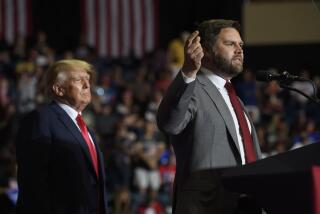In Germany, One of Unity’s Biggest Backers Backs Off : The softer wording on Christian Democrats’ platform underscores the reduced enthusiasm for integration.
- Share via
BERLIN — For some, it dilutes a dream. For others, it is merely a semantic change to clarify what was meant all along.
For better or for worse, Germany’s Christian Democratic Union--one of the most pro-European political parties in the region--will present a new draft party platform to its annual convention here Sunday with notably less ambitious wording on the goal of a united Europe.
In place of the party’s previous vision, which described a United States of Europe and an end to nation-states as they exist today, the proposed new position implies a looser European union. “The completion of European union does not mean the dissolution of nation-states,” the program declares.
The wording would likely please the likes of former British Prime Minister Margaret Thatcher and the late French President Charles de Gaulle--both of whom scoffed at the idea of a United States of Europe and talked instead in terms of a community of separate nations.
But for a party headed by Chancellor Helmut Kohl, arguably the most enthusiastic proponent of European integration, the wording has raised eyebrows. “The Christian Democrats Make a U-Turn in Their Program,” noted the respected Frankfurter Allgemeine Zeitung in the headline of its report on the document.
No such thing, argue some of those closest to the country’s largest party.
“The term ‘United States of Europe’ can be problematic,” said Melanie Piepenschneider, who heads the European policy research unit at the Konrad Adenauer Foundation, a party-owned think tank. “It was used by many who really didn’t know what it meant.”
Noting other passages in the draft platform that call for considerable transfers of sovereignty, including a full economic and currency union, she added that the party’s goals remain virtually unchanged. “We remain committed to European unity, but now the nature of the commitment won’t be misunderstood,” she said.
Despite attempts to play down the new wording, the change says much about the troubled mood in Western Europe’s largest nation as it prepares for 1994--a year in which almost 20 state or national elections are scheduled.
It underscores the reduced enthusiasm for European union, visible not just in Germany but elsewhere, as the realities of sovereignty transfers and the potential problems stemming from them grow nearer. It also reflects worries that political and economic union as outlined in the Maastricht Treaty somehow poses a threat to national identity.
With the new, softer wording, Christian Democratic party leaders hope to allay these concerns and blunt any potential challenge from the extreme right-wing Republikaner party. The southern-based organization, headed by a former member of Hitler’s Waffen SS (elite force), has scored well in its last election efforts and in national polls hovers just under the 5% level required to win seats in the Bundestag.
Besides its staunchly anti-foreigner stance, the Republikaner party gained support by opposing European union and any move to give up the deutschemark in favor of a European currency. The party program also rejects any special position for Germany within a European defense community.
The main opposition Social Democrats are now engaged in a major internal struggle on the defense issue, with the party leadership differing sharply on the future role of the German Bundeswehr.
Present constitutional limits on Germany’s military, a direct outgrowth of World War II, prevented Bundeswehr participation in the 1991 Persian Gulf War and have blocked German forces from joining French and British units in the former Yugoslav federation.
More to Read
Sign up for Essential California
The most important California stories and recommendations in your inbox every morning.
You may occasionally receive promotional content from the Los Angeles Times.













